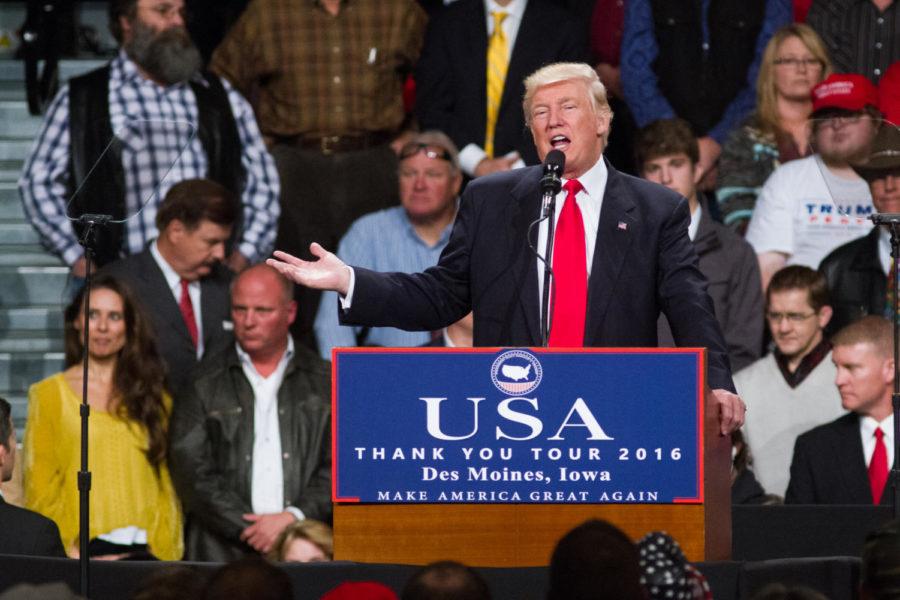Kelly: Trump must confront our political reality
President-elect Donald Trump speaks during a rally as part of his USA Thank You Tour, in Des Moines during the evening of Dec. 8. Trump spoke about the general election, how he would repeal Obamacare, bring jobs back to the US, and reform care for veterans.
April 2, 2017
“The Freedom Caucus will hurt the entire Republican agenda if they don’t get on the team, & fast. We must fight them, & Dems, in 2018!”
Donald Trump tweeted this a week after GOP leadership pulled the American Health Care Act — which by all available information would not have garnered enough votes to pass through the House — from a floor vote in Congress.
Trump, who arguably fears humiliation more than failure, evidently feels that the House Freedom Caucus, and, more generally, conservatives, are to blame for not passing the legislative abomination that was the American Health Care Act (AHCA), and the ensuing blowback. This is a ludicrous assertion for two main reasons.
First, publicly berating members of your own party is fundamentally counterproductive. This is not to suggest that all intra-party dissent is ruinous.
But Trump did not simply express ideological discord with other Republicans.
He also tweeted, “Democrats are smiling in D.C. that the Freedom Caucus, with the help of Club For Growth and Heritage, have saved Planned Parenthood & Ocare!”
In other words, Trump doesn’t take issue with the fact that some Republicans held differing viewpoints regarding health care policy; he believes that those who opposed his bill wanted to keep former President Barack Obama’s Affordable Care Act (ACA) in place. This is unfathomably asinine.
As several congressmen publicly vocalized, those who opposed the AHCA did so not because they are fond of the ACA, but for precisely the opposite reason: they felt that the AHCA was simply a slight alteration of the ACA, and that the AHCA did not fully repeal all of the bad policies currently in place under the ACA. If the representatives in question were truly in favor of preserving the ACA, they would have wholeheartedly supported the AHCA.
Additionally, just from a numerical standpoint, Trump seems to have already done himself in. Trump needs 218 votes in Congress to pass any sort of legislation. Of the 246 Republicans in Congress, 30 are members of the Freedom Caucus, and there were 10 to 15 other members who opposed the proposed AHCA bill.
Assuming Trump receives zero Democratic votes, which is highly likely. He would have, at most, 206 votes. Ironically, Trump’s choice to openly place blame for the AHCA’s failure has all but ensured — at least mathematically — that similar legislation pushed by Trump will again fail in the future.
Second, on a broad scale, Trump not only exhibited characteristic impatience in trying to get health care legislation passed so quickly but was also exposed as someone who possesses no political savvy.
Trump could not even wait three weeks to hold a vote on his health care bill. In contrast, Obama spent nearly 13 months working to ensure that the ACA would pass through Congress, and it should be noted that at the time of its conception, the ACA enjoyed much higher approval ratings than that of the AHCA, meaning the AHCA was already at a disadvantage before Trump decided he wasn’t keen on lengthy policy negotiations. This is to suggest that there is, in fact, political protocol that cannot be ignored when it comes to political dealings.
We were told during the presidential campaign that Trump would run the country like a business, draining the swamp and reshaping the Washington, D.C., political establishment as we know it. But with the AHCA debacle, Trump has now seen firsthand that the unwritten rules of politics are not so easily dismissed.
None of this is to suggest that Trump’s background in business management and his perspective as someone who has never held political office will never prove to be beneficial. But the climate of today’s politics and the nature of our current government are incomparable to a business. This is fundamentally evident in both the balance of power and the incentive structure within business and politics, respectively.
Various politicians throughout history have claimed to prioritize pragmatism, scoffing at the suggestion that they are guided by ideology. The belief that one can make the “best” decision in every situation, free of biases, is farcical.
But even if someone could truly employ a sort of pure pragmatism, it would not change the fact that politics is still guided by its old and tried playbook. It is not unreasonable to suggest that Trump is not an ideologue. Nonetheless, the unwritten rules of politics still apply to him.
Bills — especially deficient bills — cannot be rammed through Congress simply because the majority of its members share the same letter next to their name as you. Congressmen and women are not disturbing the conventional political process by voting against policy proposed by the president, nor are they expressing approval of the status quo by voting against a bill.
As it is early in his term, hopefully Trump will take from this experience that even an “outsider,” once in office, must deal with the reality of politics.
















